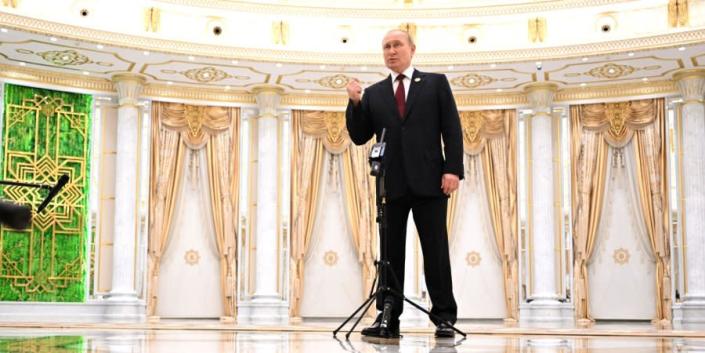
Read also: Russia is mobilizing more recruits and hiring, firing generals – ISW
However, Putin also says this: There should be “the creation of conditions that would provide security guarantees for Russia” – but at the same time he downplays this argument in his rhetoric. Such a thesis creates further uncertainty.
Obviously, producing more uncertainty is a regular tactic for Putin, he never says anything just for the sake of saying it. He always has a reason for saying it.
The uncertainty circles around what it means for Putin to be able to reach certain goals that would “provide security guarantees” for his country.
Of course, by saying this, Putin wants to preserve himself as much space for further actions as he thinks is needed. If necessary, he may always go back to his original plan for the “special operation.”
If necessary, he can reschedule and replan those territorial gains that he’s thinking about right now. Even for the Russian army, the goals of Putin’s “special operation” remain quite unclear. They’re volatile, they’re being changed all the time according to the progress, or lack of it, on the battlefields.
To add more uncertainty to Putin’s rhetoric, Russia made a “goodwill” statement after retreating from Snake Island in the Black Sea.
This is the second such declaration of “goodwill” during this war. Remember the end of March, when Russia was withdrawing its troops from Kyiv, Chernihiv and Sumy oblasts in northern Ukraine? Back then, we heard talk of “goodwill” too.
This is a sign of how Russia understands “goodwill,” and what particular actions it might take after expressing it.
Now let’s move on to analyzing all those versions voiced in the past several days to explain the most recent wave of Russian escalation – missile attacks on Ukrainian cities and their civil infrastructure. Obviously, this has nothing to do with achieving any particular military goals – it is rather revenged against Ukraine for all the success that it has had during the war.
You can’t judge Ukraine’s success by the number of its local advances, as it’s a strategic success of a much greater scale. Look at Snake Island – it’s a very painful assault on both Russia’s military positions and Russia’s public image. Moreover, it’s an assault on Putin as a strong leader.
There’s another way to explain the Snake Island developments: corruption among the Russian generals who report much bigger usage of munitions for targeting “military goals” in Ukraine, then they have a number of munitions that are not mentioned in the reserve arsenal anymore – this allows the generals to sell them and earn some money.
Russia has some sort of control procedures over the use of munitions, but it’s very likely the numbers on paper and the numbers in the storages don’t really match.
Recently I read an interesting article, the conclusions of which resonate with my previous writings. According to official information from Russian Ministry of Defense, their army destroyed several times more Ukrainian tanks, artillery and all kinds of vehicles than the Ukrainian army has ever had.
What we see is that Russians are producing fake information even within own military planning.
Therefore, I wouldn’t be surprised to see fake numbers on how many missiles Russian army is launching on Ukrainian territory. With fuel, it’s even more obvious: it gets stolen all the time.
Talking about cruise missiles, Russians can’t really sell those anywhere – even delivering them from a weapon-trading commercial entity in Russia abroad is a huge problem.
Very few countries would be able to buy Russian cruise missiles – maybe North Korea, or Iran. But these would be highly risky steps, even with a high degree of adventurism that is now prevailing in the Russian Federation.
By the end of the day, it’s Russia’s large-scale corruption and a total ignoring of international law that is becoming a decisive factor. This is why you can’t really tell what Russia will be doing next with its weapons.




